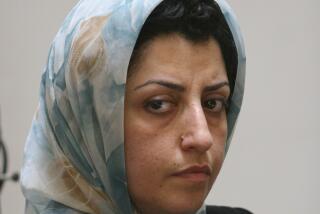Egyptian American in Cairo Gets 7-Year Jail Term for Rights Work
- Share via
CAIRO — An Egyptian American civil rights activist, who for a quarter of a century has rankled authorities here by promoting democratic ideas and calling for religious freedom, was sentenced to seven years at hard labor Monday after a court ruled he was guilty of defaming Egypt.
Following a six-month trial in the Supreme State Security Court, and thousands of pages of evidence, a judge deliberated for a little more than an hour before returning to the bench and pronouncing Saad Eddin Ibrahim and 27 co-defendants guilty. Police quickly emptied the courtroom of journalists and spectators as defendants and their families gasped and cried out.
“Not in our wildest nightmares did we think this would happen,” said Ibrahim’s American-born wife, Barbara, who was sitting beside her husband when the verdict came. “My husband was amazingly calm and clearheaded. Of course, he was stunned.”
Twenty employees of the Ibn Khaldoun Center for Social Development Studies, a Cairo-based civil rights center founded by Ibrahim in 1988, were each given prison sentences of from one to five years. Seven others received suspended one-year sentences.
In a region where dissent is not only discouraged but often punished, Ibrahim developed a reputation as one of the Arab world’s leading civil rights activists.
While officials insist that Coptic Christians are not discriminated against in Egypt, Ibrahim issued reports asserting there is institutional bias against them. While the authorities tried to present elections as free and fair, he issued reports alleging fraud. He took his message with him around the world, often speaking at conferences or giving lectures.
When he was arrested last summer, the charges revealed the nature of the government’s resentment. His alleged crimes included receiving illegal funds from the European Commission to monitor elections, offering bribes to have official documents forged and defaming Egypt in rights reports about relations between Coptic Christians and Muslims.
Initially, there was a widespread belief among his supporters that authorities were sending a heavy-handed message. Few believed that the sociology professor, who teaches at American University in Cairo, would be convicted and imprisoned.
He was released after 42 days behind bars and had remained free until the verdict. Supporters said there had been little expectation that he would be locked up again.
Some friends and colleagues predicted that the verdict will have a chilling effect within the small civil rights community in Egypt and the region. With Egypt the de facto leader of the Arab world, decisions made here concerning political, social and economic development often serve as harbingers.
“It is a very clear message that they want every person under their authority, under their hand,” said Negad Borai, a human rights activist and friend of Ibrahim. “If you want to be a real human rights activist, you must go somewhere else.”
Ibrahim, 62, received his master’s and doctorate at the University of Washington in Seattle and taught for one year at UCLA as a visiting professor in 1980.
Because of the nature of the charges, Ibrahim and his co-defendants were tried in a state security court. As a result, they do not have the right to appeal. Their only recourse is to ask a higher court for a retrial on technical grounds. Yet even if Ibrahim prevailed on that front, he would remain in prison throughout the review and a second trial. That means, at best, he could be out in a year, legal experts said.
Ibrahim, who was born in Egypt but holds U.S. citizenship, had never sought help from the United States, his wife said.
“He said he is in prison for his actions as an Egyptian. He wants to be tried as an Egyptian,” she said, adding that she supported the decision. She now thinks she was naive.
“From last summer, people have been telling us this is political, that Saad had stepped over a red line. I resisted that. . . . I can’t help but now feel that those who saw this as purely political were right.”
More to Read
Sign up for Essential California
The most important California stories and recommendations in your inbox every morning.
You may occasionally receive promotional content from the Los Angeles Times.









